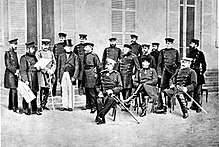Rudolph von Delbrück


Martin Friedrich Rudolph Delbrück , from 1896 von Delbrück (born April 16, 1817 in Berlin ; † February 1, 1903 there ) was a Prussian and German politician.
family
Since 1875 Delbrück was married to a woman from the Prussian noble family von Pommer-Esche. After his death, she also published his memoirs , which had previously only been printed for family members. Delbrück himself had no children, his wife brought a stepson into the marriage.
Rudolph von Delbrück belonged to a widely ramified family that held several influential positions in Prussia and Germany in the 19th century. Mention should be made of his father Friedrich Delbrück and his cousin Adelbert Delbrück . Even Hans Delbrück was family Delbrück .
Life
After studying law , during which he a. a. also heard lectures by Leopold von Ranke , Delbrück began the Prussian civil service career in 1837. In 1844 he joined the Prussian Ministry of Commerce, in 1848 he became a ministerial director in this authority and was particularly committed to free trade . The expansion of the German Customs Union was largely due to him. His greatest success was the incorporation of Hanover in 1851. Delbrück was always keen to exclude Austria and thus preserve the Prussian hegemony in the Zollverein. Delbrück understood his liberal trade policy, which was supposed to lead to economic growth , and the trade agreements, which were supposed to increase Prussia's importance in Europe, as a means of securing Prussia's supremacy over Austria . However, in 1853 he settled the resulting tensions by negotiating a trade agreement with Austria. He also participated in the trade treaty with France of 1862 and similar treaties with Belgium and Italy .
From 1867 Delbrück was President of the Federal Chancellery of the North German Confederation and was considered the “right hand man” of Bismarck , whom he often represented in parliament . There he was seen as a mediator between the Liberals and Bismarck. In 1869 he received the rank of Minister of State.
As a confidante of Bismarck, Delbrück also conducted negotiations with the southern German states in 1870, which ultimately led to the establishment of an empire in 1871. For his services in the war of 1870/1871 he received an endowment of 200,000 thalers. He was ennobled in 1896 for his services to the establishment of an empire.
In the newly established German Reich he initially remained Bismarck's closest collaborator and became President of the Reich Chancellery.
Bismarck's turning away from free trade and turning to protectionism and nationalization in the 1870s met with rejection from Delbrück, who remained true to his liberalism . After Bismarck's plan to nationalize the railways, which was kept secret from Delbrück, became known, he resigned from his office in 1876. This break, symptomatic of the increasing tensions between the Liberals and Bismarck, gave the first occasion for the "Chancellor Crisis" from 1876 to 1878.
After breaking with Bismarck, Delbrück, who was not party to the party, ran for the Reichstag election in 1878 in the otherwise national - liberal constituency of the Grand Duchy of Saxony-Weimar-Eisenach 3 (Neustadt adOrla) and was elected with a clear majority. Until the next election in 1881, he remained a member of the Reichstag , where he was committed but unsuccessful in fighting against Bismarck's protective tariff policy and the incipient social legislation , which he viewed as anti-liberal and statist .
After his death, his memoirs appeared , but they only cover the period up to 1867.
Honors
- 1881 honorary doctorate
- The Delbrückstrasse in Bremen - Schwachhausen was named after him.
- Further Delbrückstraßen are u. a. in Berlin, Brunsbüttel , Heringsdorf and Warburg .
Fonts
- Memoirs, 1817–1867 . 2 volumes. Duncker and Humblot, Leipzig 1905.
literature
- Heinrich Heffter: Delbrück, Martin Friedrich Rudolph von. In: New German Biography (NDB). Volume 3, Duncker & Humblot, Berlin 1957, ISBN 3-428-00184-2 , p. 579 f. ( Digitized version ).
Web links
- Delbrück, Martin Friedrich Rudolph in the database of members of the Reichstag
- Biography of Rudolf Martin Friedrich von Delbrueck . In: Heinrich Best : database of the members of the Reichstag of the Empire 1867/71 to 1918 (Biorab - Kaiserreich)
- Renewal of the customs treaty of 1867, largely negotiated by Delbrück
Individual evidence
- ↑ 7,245 votes against 6,502 votes for the German national candidate; see Fritz Specht, Paul Schwabe: The Reichstag elections from 1867 to 1903. Statistics of the Reichstag elections together with the programs of the parties and a list of the elected representatives. 2nd Edition. Carl Heymann Verlag, Berlin 1904, p. 274.
- ↑ BIORAB Empire
| personal data | |
|---|---|
| SURNAME | Delbrück, Rudolph von |
| ALTERNATIVE NAMES | Delbrück, Martin Friedrich Rudolph von (full name) |
| BRIEF DESCRIPTION | Prussian and German politician, MdR |
| DATE OF BIRTH | April 16, 1817 |
| PLACE OF BIRTH | Berlin |
| DATE OF DEATH | February 1, 1903 |
| Place of death | Berlin |
